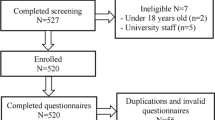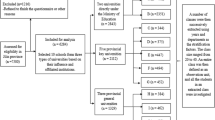Abstract
Purpose
Little is known about the association between sleep duration and health status in Chinese university students. This study examined the association between sleep duration and self-rated health in university students in China.
Methods
Altogether, 2312 subjects (928 in Macao, 446 in Hong Kong, and 938 in mainland China) were recruited. Standardized measures of sleep and self-reported health were administered. Sleep duration was categorized in the following way: < 6 h/day, 6 to < 7 h/day, 7–9 h/day, and > 9 h/day.
Results
Overall, 71% of university students reported poor health, 53% slept 7–9 h/day, 14% slept less than 6 h/day, 32% slept 6 to < 7 h/day, and 1% slept > 9 h/day. Univariate analysis revealed that compared to students with medium sleep duration (7–9 h/day), those with short sleep duration (< 6 h/day and 6 to < 7 h/day) were more likely to report poor health. Multivariate logistic regression analysis found that after controlling for age, gender, body mass index, university location, being a single child, religious beliefs, interest in academic major, academic pressure, nursing major, pessimism about the future, and depression, sleep duration of less than 6 h/day (odds ratio (OR) 1.98, 95% confidence interval (CI) 1.34–2.92, p < 0.01) was independently and significantly associated with poor self-reported health.
Conclusions
Poor health status is common in Chinese university students, which appears to be closely associated with short sleep duration. Further longitudinal studies are warranted to gain a better understanding of the interaction between sleep patterns and health status in university students.
Similar content being viewed by others
References
Krittanawong C, Tunhasiriwet A, Wang Z, Zhang H, Farrell AM, Chirapongsathorn S, Sun T, Kitai T, Argulian E (2017) Association between short and long sleep durations and cardiovascular outcomes: a systematic review and meta-analysis. Eur Heart J Acute Cardiovasc Care:2048872617741733
Buxton OM, Marcelli E (2010) Short and long sleep are positively associated with obesity, diabetes, hypertension, and cardiovascular disease among adults in the United States. Soc Sci Med 71:1027–1036
Patel SR, Hu FB (2008) Short sleep duration and weight gain: a systematic review. Obesity (Silver Spring) 16:643–653
Iftikhar IH, Donley MA, Mindel J, Pleister A, Soriano S, Magalang UJ (2015) Sleep duration and metabolic syndrome. An updated dose-risk meta-analysis. Ann Am Thorac Soc 12:1364–1372
Zhai L, Zhang H, Zhang D (2015) Sleep duration and depression among adults: a meta-analysis of prospective studies. Depress Anxiety 32:664–670
da Silva AA, de Mello RG, Schaan CW, Fuchs FD, Redline S, Fuchs SC (2016) Sleep duration and mortality in the elderly: a systematic review with meta-analysis. BMJ Open 6:e008119
Crossley TF, Kennedy S (2002) The reliability of self-assessed health status. J Health Econ 21:643–658
Geiger SD, Sabanayagam C, Shankar A (2012) The relationship between insufficient sleep and self-rated health in a nationally representative sample. J Environ Public Health:518263
Shankar A, Charumathi S, Kalidindi S (2011) Sleep duration and self-rated health: the national health interview survey 2008. Sleep 34:1173–1177
Mossey JM, Shapiro E (1982) Self-rated health: a predictor of mortality among the elderly. Am J Public Health 72:800–808
Frange C, de Queiroz SS, da Silva Prado JM, Tufik S, de Mello MT (2014) The impact of sleep duration on self-rated health. Sleep Sci 7:107–113
Chasens ER, Yang K, Baniak LM, Choi J, Imes CC (2018) Sleep and other correlates of high-level health in older adults. Geriatr Nurs 39:344–349
Magee CA, Caputi P, Iverson DC (2011) Relationships between self-rated health, quality of life and sleep duration in middle aged and elderly Australians. Sleep Med 12:346–350
Hirshkowitz M, Whiton K, Albert SM, Alessi C, Bruni O, DonCarlos L, Hazen N, Herman J, Katz ES, Kheirandish-Gozal L, Neubauer DN, O'Donnell AE, Ohayon M, Peever J, Rawding R, Sachdeva RC, Setters B, Vitiello MV, Ware JC, Adams Hillard PJ (2015) National Sleep Foundation’s sleep time duration recommendations: methodology and results summary. Sleep Health 1:40–43
Stefan L, Juranko D, Prosoli R, Baric R, Sporis G (2017) Self-reported sleep duration and self-rated health in young adults. J Clin Sleep Med 13:899–904
Steptoe A, Peacey V, Wardle J (2006) Sleep duration and health in young adults. Arch Intern Med 166:1689–1692
Stranges S, Dorn JM, Shipley MJ, Kandala NB, Trevisan M, Miller MA, Donahue RP, Hovey KM, Ferrie JE, Marmot MG, Cappuccio FP (2008) Correlates of short and long sleep duration: a cross-cultural comparison between the United Kingdom and the United States: the Whitehall II Study and the Western New York Health Study. Am J Epidemiol 168:1353–1364
Bin YS, Marshall NS, Glozier N (2012) Secular trends in adult sleep duration: a systematic review. Sleep Med Rev 16:223–230
Hale L, Do DP (2007) Racial differences in self-reports of sleep duration in a population-based study. Sleep 30:1096–1103
Yang CM, Wu CH, Hsieh MH, Liu MH, FH. L (2003) Coping with sleep disturbances among young adults: a survey of first-year college students in Taiwan. Behav Med 29:133–138
Zhang YX (2006) The relativity research of university students’ sleep method and physical endowment health in the school in Jiangsu [in Chinese. Journal of Nanjing Institute of Physical Education 20:15–18
Ma YH (2009) Investigation of health risk behavior among college students in Zhejiang and Guangxi areas [in Chinese. Chinese Journal of Health Education 25:890–893
Beck AT, Ward CH, Mendelson M, Mock J, Erbaugh J (1961) An inventory for measuring depression. Arch Gen Psychiatry 4:561–571
Pan XF, Wen Y, Zhao Y, Hu JM, Li SQ, Zhang SK, Li XY, Chang H, Xue QP, Zhao ZM, Gu Y, Li CC, Zhang YQ, Sun XW, Yang CX, Fu C (2016) Prevalence of depressive symptoms and its correlates among medical students in China: a national survey in 33 universities. Psychol Health Med 21:882–889
Goldman SE, Ancoli-Israel S, Boudreau R, Cauley JA, Hall M, Stone KL, Rubin SM, Satterfield S, Simonsick EM, Newman AB (2008) Sleep problems and associated daytime fatigue in community-dwelling older individuals. J Gerontol A Biol Sci Med Sci 63:1069–1075
Leproult R, Van Cauter E (2010) Role of sleep and sleep loss in hormonal release and metabolism. Endocr Dev 17:11–21
Suarez EC (2008) Self-reported symptoms of sleep disturbance and inflammation, coagulation, insulin resistance and psychosocial distress: evidence for gender disparity. Brain Behav Immun 22:960–968
Keckeis M, Lattova Z, Maurovich-Horvat E, Beitinger PA, Birkmann S, Lauer CJ, Wetter TC, Wilde-Frenz J, Pollmacher T (2010) Impaired glucose tolerance in sleep disorders. PLoS One 5:e9444
Hughes AJ, Parmenter BA, Haselkorn JK, Lovera JF, Bourdette D, Boudreau E, Cameron MH, Turner AP (2017) Sleep and its associations with perceived and objective cognitive impairment in individuals with multiple sclerosis. J Sleep Res 26:428–435
Wang S, Li B, Wu Y, Ungvari GS, Ng CH, Fu Y, Kou C, Yu Y, Sun HQ, Xiang YT (2017) Relationship of sleep duration with sociodemographic characteristics, lifestyle, mental health, and chronic diseases in a large Chinese adult population. J Clin Sleep Med 13:377–384
Alvarez GG, Ayas NT (2004) The impact of daily sleep duration on health: a review of the literature. Prog Cardiovasc Nurs 19:56–59
Yamada C, Moriyama K, Takahashi E (2012) Self-rated health as a comprehensive indicator of lifestyle-related health status. Environ Health Prev Med 17:457–462
Kim JH, Kim KR, Cho KH, Yoo KB, Kwon JA, Park EC (2013) The association between sleep duration and self-rated health in the Korean general population. J Clin Sleep Med 9:1057–1064
Funding
The study was funded by the University of Macau (MYRG2015-00230-FHS; MYRG2016-00005-FHS), the National Key Research & Development Program of China (No. 2016YFC1307200), the Beijing Municipal Administration of Hospitals Incubating Program (No. PX2016028), and the Beijing Municipal Administration of Hospitals’ Ascent Plan (No. DFL20151801).
Author information
Authors and Affiliations
Corresponding authors
Ethics declarations
Conflict of interest
The authors declare that they have no conflict of interest.
Ethical approval
All procedures performed in studies involving human participants were in accordance with the ethical standards of the institutional and national research committee and with the 1964 Helsinki Declaration and its later amendments or comparable ethical standards.
Informed consent
Informed consent was obtained from all individual participants included in the study.
Additional information
Publisher’s note
Springer Nature remains neutral with regard to jurisdictional claims in published maps and institutional affiliations.
Rights and permissions
About this article
Cite this article
Li, L., Lok, KI., Mei, SL. et al. Sleep duration and self-rated health in Chinese university students. Sleep Breath 23, 1351–1356 (2019). https://doi.org/10.1007/s11325-019-01856-w
Received:
Revised:
Accepted:
Published:
Issue Date:
DOI: https://doi.org/10.1007/s11325-019-01856-w




